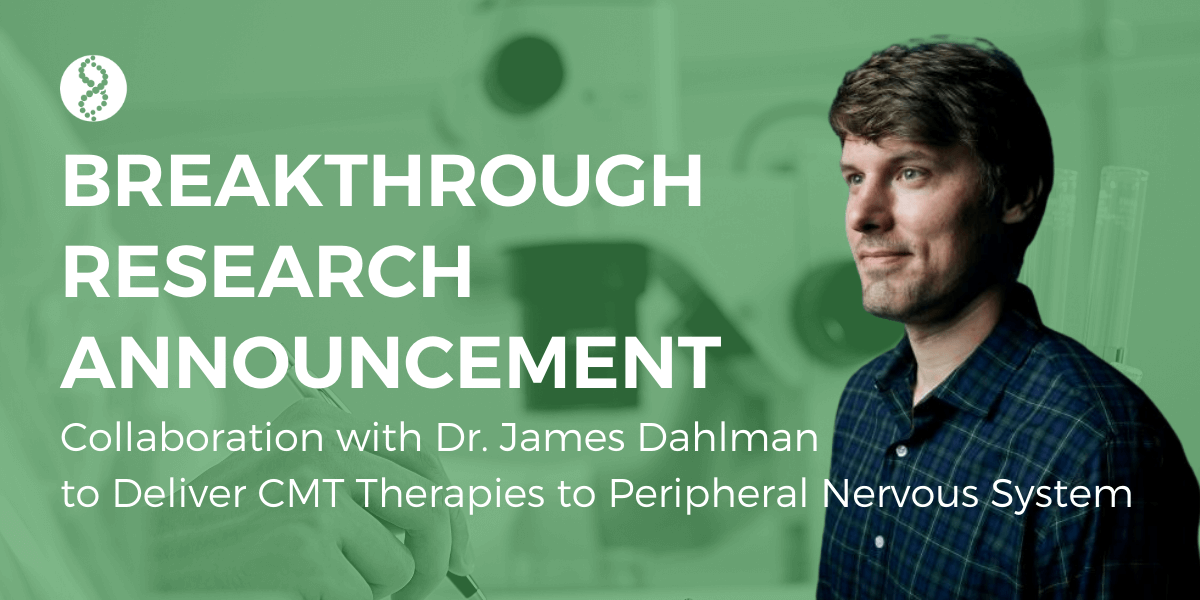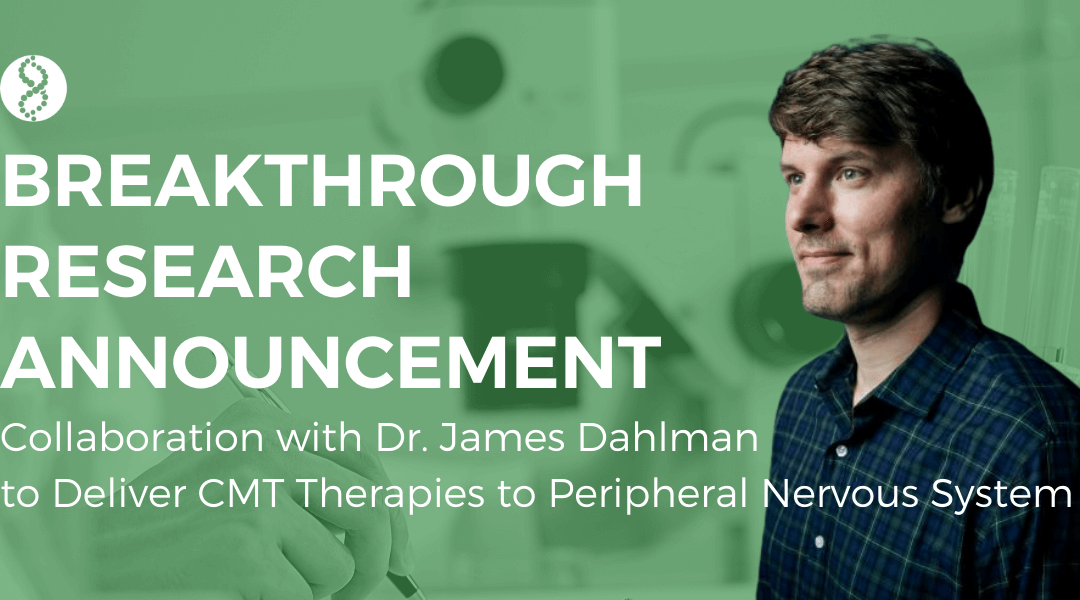Collaboration with World-Renowned Researcher Dr. James Dahlman Aims to Identify Lipid Nanoparticles for Peripheral Nervous System Delivery Using High-Throughput Screening

One of the most significant challenges in Charcot-Marie-Tooth drug development is delivering therapies to the peripheral nervous system (PNS) because the blood-nerve barrier that protects it also serves as a barrier for drug delivery.
The CMT Research Foundation has launched a groundbreaking new research collaboration today with James Dahlman, Ph.D., assistant professor in the Wallace H. Coulter Department of Biomedical Engineering at the Georgia Institute of Technology and Emory School of Medicine. This innovative partnership seeks to overcome the challenges in CMT drug delivery by using lipid nanoparticles (LNPs) to deliver therapies to the PNS that could slow, stop or even reverse the effects of CMT in patients.
LNPs are considered to be among the most advanced delivery systems for genetic therapies. You can think of LNPs as Trojan horses that help genetic therapies enter cells. The Food and Drug Administration (FDA) and European Medical Association (EMA) have already approved LNPs to treat another genetic condition. Additionally, LNPs serve as the delivery vehicle for two of the COVID-19 vaccines that have received FDA emergency use authorization and are now being rolled out worldwide. However, LNPs have not yet been tried in CMT because of the difficulty in designing them to target tissues other than the liver.
Dr. Dahlman is a world-renowned expert in the design of lipid nanoparticles and has developed a system to rapidly identify LNPs that can enter other cell types. Using this approach, he has designed nanoparticles that efficiently deliver gene therapy payloads outside the liver, and several have been licensed for clinical development.
With funding from the CMT Research Foundation, Dr. Dahlman and his research team will utilize this approach to identify LNPs that can deliver genetic therapies to Schwann cells — the specialized cells that protect the peripheral nerves and whose dysfunction causes disease in the most common forms of CMT.
“I am excited to work with the CMT Research Foundation as they continue their work on an important, too prevalent disease. I am hopeful that our approaches to improve gene therapies can lay the foundation for drugs that benefit patients in the future.” ~Dr. James Dahlman
If successful, findings from this study could ultimately result in the design of therapies for CMT patients that restore normal protein function. Additionally, Dr. Dahlman’s involvement in CMT research promises to attract more attention from academia and industry to CMT therapy development to speed the delivery of treatments and cures.
About Dr. James Dahlman
Dr. Dahlman’s lab works at the interface of drug delivery, genomics and gene editing by applying big data and technology development approaches to nanomedicine. His students have developed DNA barcoded nanoparticles — think of these as name tags — to measure how hundreds of nanoparticles deliver mRNA and siRNA in multiple cell types all in a single animal. Since 2016, the lab has used DNA barcoding to quantify more than 4,500 nanoparticles in living organisms, thereby identifying nanoparticles that deliver RNA to new cell types without targeting ligands. His lab uses these approaches to improve cell type-specific gene therapy targeting and to identify genes acting as master regulators of nanoparticle delivery.
Dr. Dahlman has published in Science, Cell, Nature, Nature Nanotech, Nature Biotech, Science Translational Medicine, Advanced Materials, JACS, PNAS, Scientific American, and other high-impact journals. Dr. Dahlman has won the Rita Schaffer Award, ASGCT Outstanding New Investigator Award, GT Outstanding Achievement in Early Career Research Award, Tech Review TR35, Controlled Release Society GDGE Award, had his barcoding work described as a Top 10 Emerging Technology by the World Economic Forum and won young investigator awards from CMBE, Bayer, Parkinson’s Foundation, Journal of Materials Chemistry B, and others.
Dr. Dahlman has a B.S. in Biomedical Engineering from Wright State and received his Ph.D. from the Harvard-MIT HST Program, where he studied non-liver RNA delivery with Robert Langer. As a postdoc, he studied CRISPR-Cas9 with Feng Zhang at the Broad Institute. In addition to his work at Georgia Tech and Emory University, Dr. Dahlman is also a co-founder and board member of Guide Therapeutics, a biotech company based on DNA barcoding.
Help Advance CMT Drug Development
While no treatments or cures currently exist for CMT, scientific innovations like those being studied by Dr. Dahlman can change that. Your donation to the CMT Research Foundation is the fastest way to move these and the next big breakthroughs forward without delay.
Together, we can change the course of CMT during our lifetime — and for every future generation.


This is very exciting news! Looking forward to progress and updates on this incredible work!
Praying ???? for a breakthrough